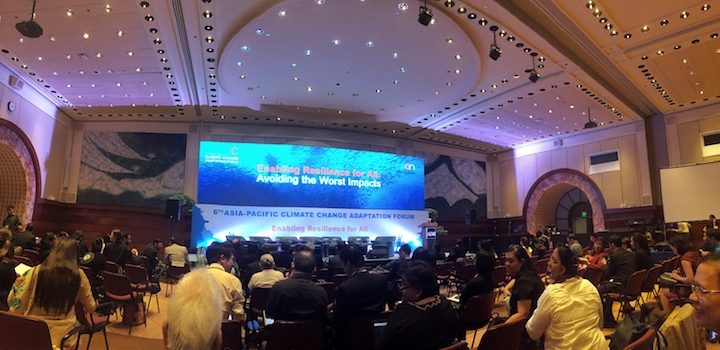SUMMARY
This is AI generated summarization, which may have errors. For context, always refer to the full article.
![[OPINION] Fighting climate change: More than state agreements and policymaking](https://www.rappler.com/tachyon/r3-assets/612F469A6EA84F6BAE882D2B94A4B421/img/B781BB666729402DADF9F8DAE09D6AF2/20140710-climate-change-shutterstock.jpg)

The timely and relevant gathering two weeks ago of hundreds of climate scientists, disaster risk reduction managers, academicians, advocates, and stakeholders during the 6th Asia Pacific Climate Change Adaptation (APCCA) Forum served as a platform to discuss humanity’s future.
The much-talked-about special report of the United Nations Intergovernmental Panel on Climate Change (IPCC) pertaining to the 1.5°C global temperature threshold is a subject of concern among practitioners. But more than the science, the effects of the increasing global temperature have caused alarm especially to the most vulnerable countries.
1.5°C threshold
With stronger tropical cyclones, floods, droughts, heat waves, tsunamis and earthquakes, our leaders have to shift the focus from the effects to the causes of disasters. The stories told should no longer just involve the deaths and the damage. They must highlight the root causes in order to derive the appropriate solutions.
Under the Paris Agreement, nations agreed to combat climate change by limiting the global temperature increase to 1.5°C. The central aim is to strengthen the global response to climate change and to support developing countries in adapting to its effects. It was a milestone in our bid to secure our safety and save the generations ahead of us. (READ: Fighting climate change: What is the Paris Agreement?)
But what happened?
Certainly, 12 to 20 years from now, we will hit the 1.5°C threshold without major cuts in carbon emissions. The same IPCC report indicates that the impact and the costs of this would be far greater than expected.
More than the financial obligations of highly industrialized countries, the agreement requires a solid commitment to reduce carbon dioxide emissions of all countries. This is not just about how much you can “donate,” this is about how many lives and properties we can save from climate-related hazards.
Continuing the battle
The Asia-Pacific Adaptation Network’s APCCA Forum provided a platform to pull together significant individuals across the globe to continue the work that we have all started. We have to continue the work as much as we can and as fast as we can.
As Secretary Emmanuel de Guzman of the Philippines’ Climate Change Commission emphasized in his welcome address: “We must adapt, but also deploy more efficient, competition-driven, decentralized clean energy systems, promote inclusive mobility, build green, embed transparency, promote accountability, and bake resilience into long-term development policy.”
De Guzman’s statement highlights how innovations in the field of climate change can help us adapt and mitigate the effects of its threats, coupled with a long-term policy to enable resilience for all countries.
Throughout the 3-day event, everyone talked about the 1.5°C threshold with high hopes that we will reduce it in the coming years. Cases and studies were presented not to cause alarm and panic, but to draw out solutions that could dramatically change the stakes of climate change.
Indeed, it is an urgent matter and people are taking it seriously.

The threats of climate change transcend economic and political boundaries. These are shared by every nation in the same way as the responsibility to prevent, mitigate, and adapt to its effects.
But more than the state agreements and policymaking of our leaders, the ability of each of the 7 billion people in the world to help does count in reducing the 1.5°C threshold. We can all do something to reduce our carbon footprints.
The 2030 deadline stated in the IPCC special report would not matter if we keep tormenting the planet with our activities. All of us will eventually suffer the consequences, regardless of a country’s economic growth.
One nation cannot save only itself; it’s either we help each other or we lose everything. The clock is ticking. – Rappler.com
Rachelle Anne Lucena Miranda is a graduate student of the Master of Disaster Risk and Resilience program of the Ateneo de Manila University. She currently serves as an information officer at the Office of Civil Defense.
Add a comment
How does this make you feel?
There are no comments yet. Add your comment to start the conversation.